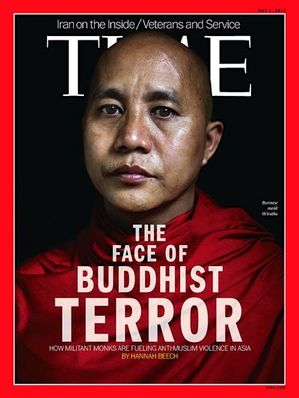Cultural competence: Can a Buddhist monk be an anti-Muslim Bin Laden?

TIME features “the Burmese bin Laden” this week. TIME is reporting on U Wirathu, a monk in a peaceful religion who advocates violence against Muslims — the same tool Osama bin Laden used on behalf of Muslims. (No, the TIME cover at right isn’t what you received at home this week in the U.S. edition; this is TIME’s Asian edition.)
Islam is the world’s second largest religion, after Christianity. Buddhism is fourth. (See our December story about the world’s religious populations.) In Myanmar, formerly know as Burma, Muslims are in the minority, and Wirathu says they threaten Burmese nationality. Muslims and Buddhists have been attacking each other there.
Before the magazine was on newsstands, Buddhists criticized it, posting on Facebook mock versions of the Asian cover—with the word “Boycott” added in protest.
The Washington Post quoted political analyst Yan Myo Thein as saying, “Some people misunderstood the title … seeing it as an insult to religion. They believe it’s equating Buddhism with terrorism.”
Wirathu, shown in red robes in the TIME article, responded to it by saying, “A genuine ruby will shine, even if you try to sink it in mud.”
Some say images of country and religion are being confused and condemned.
The TIME article said, “Every religion can be twisted into a destructive force poisoned by ideas that are antithetical to its foundations. Now it’s Buddhism’s turn.”
The problem in gaining cultural competence is that there is no singularly authentic cultural experience. Everyone is a mix of ethnicity, religion, politics, race, family and more. Learning from one person is just the barest beginning. The Read the Spirit/Michigan State University guides to cultural competence use a 100-question format to open that door. But they are just the start.
Can one separate culture, religion or nationality from the others?
Is religion violent, or does politics make it seem that way?
Does the image of Islam change when it becomes the target of violence?
Originally published on OurValues.org.
Wayne Baker is a sociologist on the faculty of the University of Michigan Ross School of Business. Baker blogs daily at Our Values and can be reached at ourvaluesproject@gmail.com or on Facebook.


Comments
Joe Grimm
Sun, Jun 30, 2013 : 4:39 a.m.
Thanks for your thoughts/comments. Maybe I did not state my point clearly. I wrote "there is no singularly authentic cultural experience." My meaning was that no single way is the right way or the only way or the pure way. Our experiences are as different as we are. One person's identity or experience in no way invalidates others. As we learn about cultural dimensions, we have to talk to many people and then keep an open mind for all the possibilities in the people we have not heard from yet. Thanks again for your observations.
Gramma
Sat, Jun 29, 2013 : 12:46 p.m.
All the major religions have love as their core. None of them practice it in reality. Terrorism has become the word to destroy and divide like the word communism was used in the past. Christianity does its share in spreading "terrorism," when the strongest "Christian" nation in the world bombs and slaughters innocents in its desire to force "democracy" on the world. In the past, Christians slaughtered millions of people in the name of God. The media is responsible for continuing this division and destruction by presenting individuals as the "face of a religion." This division serves the purpose of the wealthy and governments. People who live in fear and are encouraged to vent their rage on particular groups of people are easily manipulated into violence.
ThinkingOne
Sat, Jun 29, 2013 : 2:56 p.m.
You seem to be blaming 'Christians' and 'the media' for everything wrong in history. What a wonderful world you must live in where everything is so simple. BTW the person in question was identified as 'the face of Buddhist TERROR', not the face of Buddhism. If he is preaching violence against Muslims in the name of his religion, then I would say 'the media' has that much correct.
Lorrie Beauchamp
Fri, Jun 28, 2013 : 1:54 p.m.
The answer to your question is no. However, the question begs a question. I have been studying buddhism for almost 15 years and have incorporated many of its precepts into my existence. Buddhism is a philosophy, not a religion. The intent behind the philosophy is to discourage labelling and segregation of all kinds. We are all one. So any individual who feels he or she is part of an organized movement cannot be said to embrace the precepts of buddhism. It's that simple. On the other hand, all world religions are, at their core, about love. Violence is a result of our attachment to religion, and our need to convince others (foolishly) that there is only one right way. Wanting (in your words) a "singularly authentic cultural experience" is, once again, trying to divide and conquer. The philosophy of buddhism teaches us otherwise. And the TIME article has it all wrong. Too bad their writers didn't look closer or further away.
Gramma
Sat, Jun 29, 2013 : 12:48 p.m.
I know people who consider themselves Buddhist and consider this to be their faith or religion not a philosophy. There is more than one branch of Buddhism as their is of Christianity, Judaism and Islam.